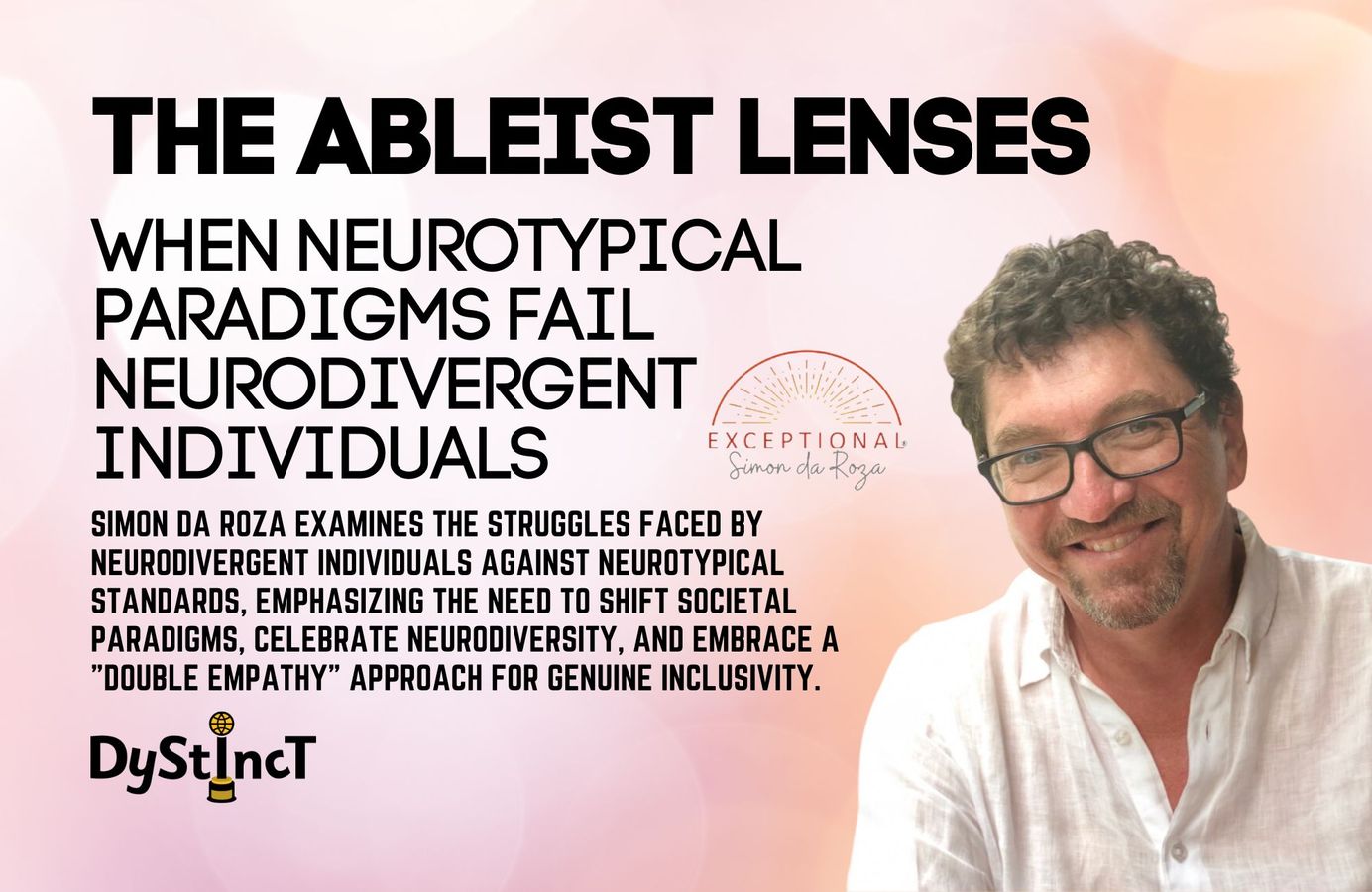
Issue 18: The Ableist Lenses: When Neurotypical Paradigms Fail Neurodivergent Individuals | Simon da Roza
Simon da Roza examines the struggles faced by neurodivergent individuals against neurotypical standards, emphasizing the need to shift societal paradigms, celebrate neurodiversity, and embrace a "double empathy" approach for genuine inclusivity.
Society is built on a collection of norms and conventions. The way we think, behave and understand the world is heavily influenced by the "majority rules" principle. However, this collective agreement becomes a concern when it disregards or marginalises the experiences of neurodivergent individuals. These individuals, who may have ADHD, autism, dyslexia, or other neurodivergences, often find themselves measured against neurotypical standards. Unsurprisingly, this leads to misunderstandings, misconceptions, and ableist perspectives.
The Consistency Conundrum
The Consistency Conundrum
Take, for example, the value our society places on consistency. Consistency is often associated with dependability, discipline, and success. People who can chip away at tasks over time are seen as committed, while those who might procrastinate but burst into activity right before a deadline are viewed as inconsistent or unreliable.
For many with ADHD, consistency can be a significant challenge. Their brains are wired differently, making the traditional task approach a real struggle. Instead, the adrenaline of a looming deadline can suddenly make things click. Labelling them as "inconsistent" or "procrastinators" based on a neurotypical understanding is unfair and oversimplified. It disregards the unique ways in which the ADHD brain functions and thrives.
Other Misconceptions about Neurodivergence
Other Misconceptions about Neurodivergence
Emotional Intensity
Many neurodivergent individuals experience emotions differently. For instance, some autistic people might react strongly to seemingly minor events, while others might seem indifferent to situations that typically elicit strong emotional reactions. Labelling these reactions as "overreactions" or "apathy" fails to understand the diverse, dynamic landscapes of neurodivergent minds.
Social Interaction
While it's a known fact that many autistic individuals find social interactions challenging, it's a misconception that they don't want or value social connections. The neurotypical expectation of making consistent eye contact, reading between the lines, or understanding unwritten social rules can be daunting for them. Instead of acknowledging these differences, society often labels them as "rude" or "antisocial."
Cognitive diversity
Dyslexic individuals might struggle with reading and writing but excel in other areas like spatial understanding or hands-on tasks. However, these strengths often go unnoticed because our education system relies heavily on written tests and assessments. Rather than being seen as different learners, they are wrongly labelled as "slow" or "inattentive."
Sensory Processing
Sensory sensitivities are common among neurodivergent individuals. Loud noises, bright lights, or certain textures can be overwhelming. Instead of recognising these sensitivities, society often dismisses them as "being fussy" or "overreacting."
Championing Neurodiversity
To move towards a more inclusive society, it's crucial to shift our paradigms. Neurodivergent individuals shouldn't be seen through a neurotypical lens. Instead, their experiences, strengths, and challenges should be understood on their own terms. Celebrating neurodiversity means recognising that every brain has its unique way of processing the world. By creating environments that cater to diverse neurological experiences and spreading awareness about the vast spectrum of neurodivergence, we can work towards dismantling these outdated and ableist perspectives. After all, understanding and acceptance lie at the heart of a genuinely inclusive society.
Unmasking and Embracing Differences
The journey towards a more inclusive society doesn't merely stop at recognising the unique challenges and strengths of neurodivergent individuals. A pivotal part of this journey involves challenging societal norms that force neurodivergent individuals to "mask" or mimic neurotypical behaviours to fit in. By insisting on this, we ask them to hide parts of themselves, which can profoundly affect their well-being and mental health.
The Weight of the Mask
For many neurodivergent individuals, especially those within the autistic community, "masking" is a learned behaviour. It's consciously mimicking neurotypical behaviours to fit in or avoid standing out. This might mean forcing oneself to make eye contact, suppressing stimming behaviours, or pretending to understand a social nuance. Over time, this can be exhausting, leading to burnout, anxiety, and isolation.
This post is for paying subscribers only
SubscribeAlready have an account? Log in


